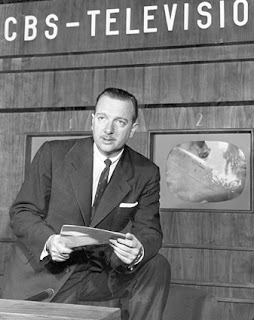
Douglas Edwards had the job first. Dan Rather was in the anchor chair longer, but Walter Cronkite will forever be remembered as THE anchor of the "CBS Evening News."
I was too young to remember Cronkite's coverage of the Kennedy assassination, but I do remember how Walter Cronkite handled space flight missions and the trips to the moon. It was a combination of hard nosed journalism and plain old American pride.
I've been watching a lot of YouTube.com stuff on the Apollo 11 mission, and I was struck at the long periods of time Cronkite said nothing-- how he let the pictures and the words of Mission Control and the astronauts tell the story.

As all this was going on, there was a very unpopular war in Vietnam. I can still hear Cronkite giving the nightly numbers of American servicemen and enemy troops killed in action-- the body count. The Cronkite commentary against the war, delivered after a visit to Vietnam for a first hand look, was one of the factors in Lyndon Johnson dropping his bid for re-election. Johnson reasoned, correctly, that if he lost Cronkite, he lost the nation.
Woodward and Bernstein did the leg work on Watergate, but Cronkite explaining it, over two nights on CBS, brought it into focus.
And then, there was Cronkite's sign off in March of 1981. It was blessedly simple and low key.
On a lighter note, I was the producer of WYOU's morning news for eleven months in 1997 and 1998. I'd write something funky. Anchor Derry Bird would walk over to my desk and ask "Would Cronkite say it that way?" I knew exactly what Derry meant, and I changed my copy to keep Derry happy. There was another reason to do it. It was the right thing to do.
I have tons of books in boxes. A select few are kept on a book shelf where I can grab them at a moment's notice. Cronkite's autobiography is always close at hand.
The cable news networks, except for HLN, dropped the Michael Jackson stuff for Cronkite tributes Friday night. They were well done. It was nice hearing from Cronkite's colleagues, those who helped invent television news.
NBC Nightly News anchor Brian Williams spent some time working for WCBS several years ago. One of the first items on his agenda when he got to CBS was the see the remnants of Cronkite's old set, the one with the world map on the back wall.
There are several good newspaper columns out there today. It would be impossible to list them all, but make it a point to read What Kurtz and Shales had to say in the Washington Post.
There are several other Cronkite clips at YouTube, and take a look when you get the chance. It was all so clean, so simple. Here's what you need to know. Cronkite was the biggest name in American television journalism. Yet, he was never bigger than the story. There was none of that "Hey, look at me" stuff I'm constantly complaining about.
There will never be another Walter Cronkite.
